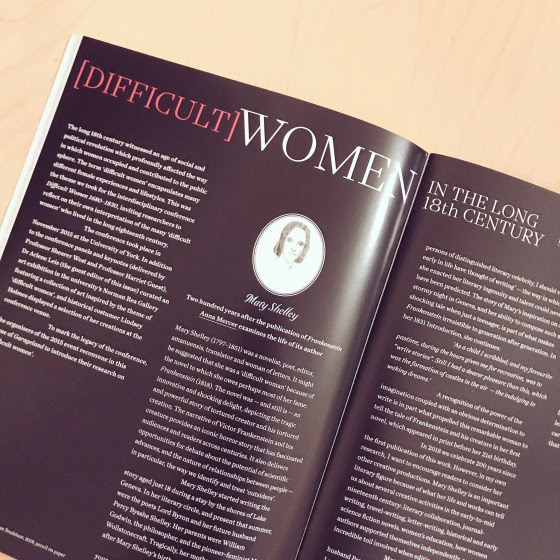Difficult Women in the Long Eighteenth Century
Posted on 18 December 2018

The 2015 CECS conference ‘Difficult Women 1680-1830’ in 2015 invited researchers to reflect on their own interpretation of the many ‘Difficult Women’ who lived in the long eighteenth century. Papers addressed many different female experiences and lifestyles, from religiously non-conformist women to women bearing arms
The Difficult Women team consisted of four then-PhD candidates at CECS (Sarah Burdett, Jessica Clement, Anna Mercer, and Elizabeth Spencer) and one CECS alumni (Ruth Scobie). I’m thrilled to announce that we have reunited three years later in 2018 to produce a collaborative piece for the arts and culture magazine Garageland (pictured). We were invited to contribute by another participant in the original Difficult Women project, Arlene Leis, who curated a temporary exhibition of the same name in the Norman Rea Gallery in 2015 to coincide with the conference. She was the guest editor of this edition of Garageland.
Originally planned as a one-day event, the response to the call for papers in 2015 was so strong that the event was expanded to two days, taking place on 27-28 November at the Berrick Saul Building (home of the Humanities Research Centre) at York. The keynote speakers were Professor Shearer West and Professor Harriet Guest.
The conference was sponsored by CECS at York, the Humanities Research Centre, the British Society for Eighteenth Century Studies, and the Royal Historical Society. It was attended by lively and engaged delegates who contributed to a range of literary, historical and artistic debates.
We are delighted to have the opportunity to mark the legacy of the conference. In the Garageland article, organisers of the 2015 event reconvene to introduce their research for this special issue of the zine, the theme of which is – of course – ‘Difficult Women’. Seek out the publication to read about a range of eighteenth-century women, including warriors, women accused of crime, and the writers Elizabeth Singer Rowe and Mary Shelley, as well as the ordinary women whose experiences are just as important to our understanding of the past.
Thank you to CECS for bringing us all together!
